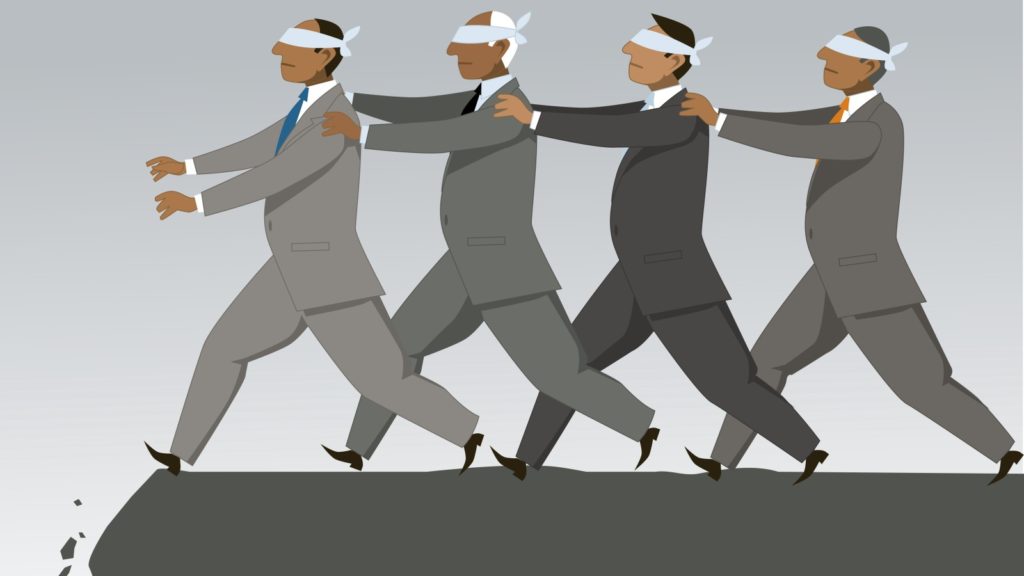
The pull to go along with the crowd is always present. It’s even more insidious because we’re often unaware of how strongly we’re being pulled. We simply go along with what everyone else is saying and doing.
The urge to belong is elemental. We want to be liked, respected, even protected by the shelter of the wider group. When differences arise, there is an overpowering “strain for consensus,” narrowing what divides us so we can huddle around what we agree on—even when that agreement is vague or represents the lowest common denominator.
We don’t want to be perceived as “different from everyone else,” even when we know (or at least suspect) that the herd is moving in the wrong direction. That’s because raising a dissenting voice has consequences.
Because your dissent challenges a majority’s certainty, group members almost never like it. When you speak your personal truth to the group’s collective power, they’ll ridicule you or paint you as a crank. Even when you change a group member’s private views with your logic and conviction, she’ll rarely acknowledge it publicly and almost never give you credit. Dissenting seems a thankless task.
Dissenters also have to be willing to go it alone, and that takes personal courage. As a result, thinking about his or her dissent, it’s always easier for a potential dissenter to conclude:
- the group is unlikely to accept my position anyway, so why bother raising it;
- the personal costs to me of speaking up are just too great; or
- I just don’t care enough about the group or my point of view to speak my mind.
I’ve certainly used one or more of these excuses many times over.
Dissenters As Troublemakers
I just finished reading Charlan Nemeth’s new book In Defense of Troublemakers: The Power of Dissent in Life and Business. I picked it up for several reasons.
Troublemakers promised to discuss the impact of dissenter Edward Snowden’s disclosures about government wiretapping, the value to Lincoln and to America of having his principal rivals (a band of dissenters) as his key Cabinet advisors, the “choreography” that Henry Fonda employed in “Twelve Angry Men” to turn his lone dissent into a verdict embraced by all of his fellow jurors, and the colossal failure of groupthink in JFK’s Bay of Pigs fiasco. I picked up her book for the stories she’d be telling, but also because I’ve paid some of the costs of troublemaking over the years and wanted to see whether they were worth it.
I’d like to share with you some of Nemeth’s study-based conclusions about groupthink, consensus, dissent, enabling dissent via diversity or a devil’s advocate, and how the common presumptions about dissenters don’t have to be true.
GROUP THINK
People automatically follow the majority as much as 70% of the time, even when the majority is wrong. People do so because the group “works on you” to conform in blatant as well as subtle ways. Moreover, the remaining 30% are not unscathed by group pressure. In one study, even though the minority disagreed with the group, many reported that the majority was “probably correct” because the group must know something that they didn’t know.
CONSENSUS
Consensus changes our thinking in ways that are narrow and controlled, whereas dissent broadens and opens our thinking. Nevertheless, because of an ever-present “strain for consensus,” when most group members know the majority’s views up front, studies repeatedly show that group members want to find out more about why the majority holds its views so they are more comfortable supporting them rather than exploring grounds for disagreement when they have that choice. On this point, Nemeth writes: “Simply knowing the majority position is enough to shape and bias the search for information. We don’t just follow the majority position; we willingly search for information that corroborates it.” Other studies indicate that people are careful to share with other group members ONLY the information they hold in common while withholding information where they might differ—a result that further narrows and controls consensus’ views.
DISSENT
Even one dissenter in a group makes a profound difference in the range of issues the group considers and the creative ways that it goes about processing them. Notwithstanding the likelihood of hostile reactions, a dissenter has the floor and can argue his position because he is the focus of attention and communication. There is no question that he needs to be courageous in order to do so, but his courage can also be contagious, increasing the likelihood that other members of the group will speak up even if they don’t agree with everything he’s saying. “In witnessing dissent,” Nemeth writes, “they seem to be reminded that their actions should mirror their beliefs” and that it’s a mistake to follow the majority blindly.”
EFFECTIVE DISSENT
Research shows that a necessary requirement for effective dissent is consistency. Backsliding as well as compromise undermines it in the absence of new information. In other words, the dissenter needs to hold her ground. Group members rarely admit publically that they changed their minds because of a dissenter, but they are often persuaded privately, which liberates them to consider not only the dissenter’s opinion but also other opposing views. Writes Nemeth: “I believe that part of the reason dissent opens the mind is that it makes us question our positions. Faced with an alternative conception of reality and a different way of thinking, we are brought closer to the kind of thinking we do when developing a position rather than defending or changing one.” In other words, dissent operates like a mental re-set, allowing us to reconsider what we know and believe to be true.
DIVERGENT THINKING
The most durable problem solving considers as many issues, obstacles, perspectives and opportunities as possible before reaching a conclusion, while groupthink and the pull of consensus tend to be both shallow and brittle. Dissent also changes more minds and hearts than is publically evident, which means that when we speak up, we’re having more impact than we know. One place where the impact of a dissent is clear is at the Supreme Court. From studying the high court’s opinions with and without a dissent, a strong dissenting opinion nearly always produces more “integrative complexity” in the majority’s reasoning than is evident in its unanimous opnions. The majority is not only more aware of differing views but is far more likely to respond to them in reasonable and creative ways. The same divergent thinking is unleashed in nearly every group where even a lone dissenter presents her consistent opposition to the group’s consensus.
DEVIL’S ADVOCATES AND GROUP DIVERSITY
Nemeth also challenges efforts to take “the sharp edge” off dissent with a devil’s advocate and politically correct notions that “diversity within a group” is all you need to produce divergent thinking. She calls devil’s advocates offering dissenting viewpoints “pretend dissent” which group majorities almost uniformly disregard because of the lack of conviction behind them. Assuming that a group with gender, race or sexual-preference diversity will produce divergent thinking is similarly misguided. Divergent thinking is only enhanced when group members have “opinion diversity” based on their different skills, knowledge and backgrounds AND are willing to speak up when what they know and believe to be true is challenged by the majority.
OUR PRESUMPTIONS ABOUT DISSENTERS ARE WRONG
Nemeth wants to give dissenters “a better name.” Instead of seeing them as objects of ridicule or hostile parties, she’d prefer us to see them as not necessarly angry, argumentative, ego-driven or obstacles to the group’s moving forward. It’s where recalling the dissent voiced by the real Edward Snowden and the fictional Henry Fonda resonates. Both were tenaciously consistent and consistently earnest in their dissent. Neither raised his voice, appeared holier-than-thou or ever lost sight of what they wished to accomplish. They weren’t negative for the sake of being negative. Even when dissenters sound like voices “crying in the wilderness,” the consistent and courageous ones don’t want to offend. Instead they want to wake the others in the group out of their sleepwalking, whether that group is a jury room or the American people. When dissenters have good intentions and treat others with respect, it is hard (and hardly ever necessary) to offend.
These are some of the main points in Troublemakers, and I recommend it both for the nuance of Nemeth’s arguments and for her well-chosen stories. The benefits to group decision making are clear from her analysis. What Troublemakers doesn’t answer is why individuals “care enough” to take up the lonely mantle of dissent in the first place.
Why Voice Your Dissent?

Voicing your dissent begins with a realization about what you know and believe given your group’s deliberations. Nemeth acknowledges the power that comes from recognizing them—and how you never want to lose them—without elaborating on the deeper motivations behind your convictions. Knowing what you know and believing what you believe seems to be a form of recognition tied to personal identity, but again, Nemeth delves no deeper here.
She does talk about the courage that you need in order to dissent. While Nemeth doesn’t say, courage for her might be similar to Aristotle’s concept of courage, which is the motivation you have between acting recklessly and being afraid to act. In other words, you find your courage where feelings of recklessness and fear of acting balance one another. It’s about finding that happy medium.
Courage is easier to find in some situations, and becomes more reliable when you learn how to find it when you need it. You learn how to be courageous by being courageous, and one way is by being a dissenter when what you know and believe is challenged.
In a short essay several years ago, Gordon Marino argued that boxing is another way to find that balance, a surprising argument until you think about it. Being in a boxing match provides you with measurable doses of fear while helping you manage your reckless impulses in real time.
While Aristotle is able to define courage, the study and practice of boxing can enable us to not only comprehend courage, but [also] ‘to have and use’ it. By getting into the ring with our fears, we will be less likely to succumb to trepidation when doing the right thing demands taking a hit.
Other “jobs” provide opportunities for courage if we recognize the opportunities and act on them. It can be as close as the next community meeting where what you know and believe to be true is called into question by the group’s evolving consensus.
It is not just “knowing what you know or believing what you believe,” but also having the courage to declare it. It is caring enough about yourself to demonstrate who you are—the ever-present impulse to be “true” to yourself. Of course, the basic human desire to express your convictions in order to help the group is the other essential motivation behind dissent. It’s for me but also for you.
The motivations behind dissent are the same motivations that drive all good work.
Notes to readers: Much of the content in this post also appeared in the June 3, 2018 newsletter.
Leave a Reply